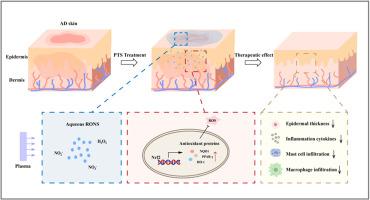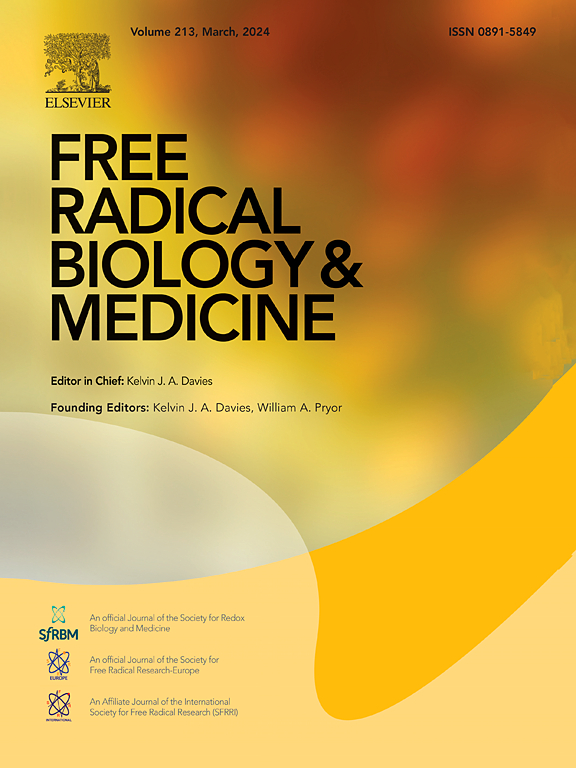Therapeutic potential of plasma-treated solutions in atopic dermatitis
IF 7.1
2区 生物学
Q1 BIOCHEMISTRY & MOLECULAR BIOLOGY
引用次数: 0
Abstract
Atopic Dermatitis (AD) is a prevalent inflammatory skin disease that is currently incurable. Plasma-treated solutions (PTS) (e.g., culture media, water, or normal saline, previously exposed to plasma) are being studied as novel therapy. Recently, PTS is gaining attention due to its advantages over non-thermal plasma (also known as cold atmospheric plasma). Thus, we explore the application of PTS in treating AD. In vivo experiments demonstrated that PTS significantly alleviated AD-like symptoms. It reduced mast cell and macrophage infiltration, decreased scratching times and serum IgE levels. These therapeutic effects of PTS on AD mice were associated with the activation of the antioxidant molecule Nrf2. In vitro experiments revealed that PTS could decrease ROS level and regulate cytokine expression (such as IL-6, IL-10, IL-13 and CCL17) in TNF-α/IFN-γ-stimulated keratinocytes and LPS-stimulated M1 macrophages. Additionally, PTS could upregulate the expression of antioxidant stress molecules such as Nrf2, HO-1, NQO1 and PPAR-γ in both cell types. Overall, PTS demonstrated potent therapeutic potential for AD without notable side effects. Our research provided a promising approach to AD treatment and may serve as a potential therapeutic strategy in other inflammatory skin diseases.

等离子处理液对特应性皮炎的治疗潜力
特应性皮炎(AD)是一种常见的炎症性皮肤病,目前尚无法治愈。经等离子体处理的溶液(PTS)(如培养基、水或生理盐水,之前曾接触过等离子体)正被作为新型疗法进行研究。最近,PTS 因其优于非热等离子体(又称冷大气等离子体)而备受关注。因此,我们探讨了等离子体在治疗注意力缺失症中的应用。体内实验表明,PTS 能明显缓解 AD 类症状。它减少了肥大细胞和巨噬细胞的浸润,降低了搔抓次数和血清 IgE 水平。PTS 对 AD 小鼠的这些治疗效果与激活抗氧化分子 Nrf2 有关。体外实验显示,PTS 可降低 ROS 水平,并调节 TNF-α/IFN-γ 刺激的角质形成细胞和 LPS 刺激的 M1 巨噬细胞中细胞因子(如 IL-6、IL-10、IL-13 和 CCL17)的表达。此外,PTS 还能上调两种细胞中 Nrf2、HO-1、NQO1 和 PPAR-γ 等抗氧化应激分子的表达。总之,PTS对AD具有强大的治疗潜力,且无明显副作用。我们的研究为AD治疗提供了一种前景广阔的方法,并可作为其他炎症性皮肤病的潜在治疗策略。
本文章由计算机程序翻译,如有差异,请以英文原文为准。
求助全文
约1分钟内获得全文
求助全文
来源期刊

Free Radical Biology and Medicine
医学-内分泌学与代谢
CiteScore
14.00
自引率
4.10%
发文量
850
审稿时长
22 days
期刊介绍:
Free Radical Biology and Medicine is a leading journal in the field of redox biology, which is the study of the role of reactive oxygen species (ROS) and other oxidizing agents in biological systems. The journal serves as a premier forum for publishing innovative and groundbreaking research that explores the redox biology of health and disease, covering a wide range of topics and disciplines. Free Radical Biology and Medicine also commissions Special Issues that highlight recent advances in both basic and clinical research, with a particular emphasis on the mechanisms underlying altered metabolism and redox signaling. These Special Issues aim to provide a focused platform for the latest research in the field, fostering collaboration and knowledge exchange among researchers and clinicians.
 求助内容:
求助内容: 应助结果提醒方式:
应助结果提醒方式:


